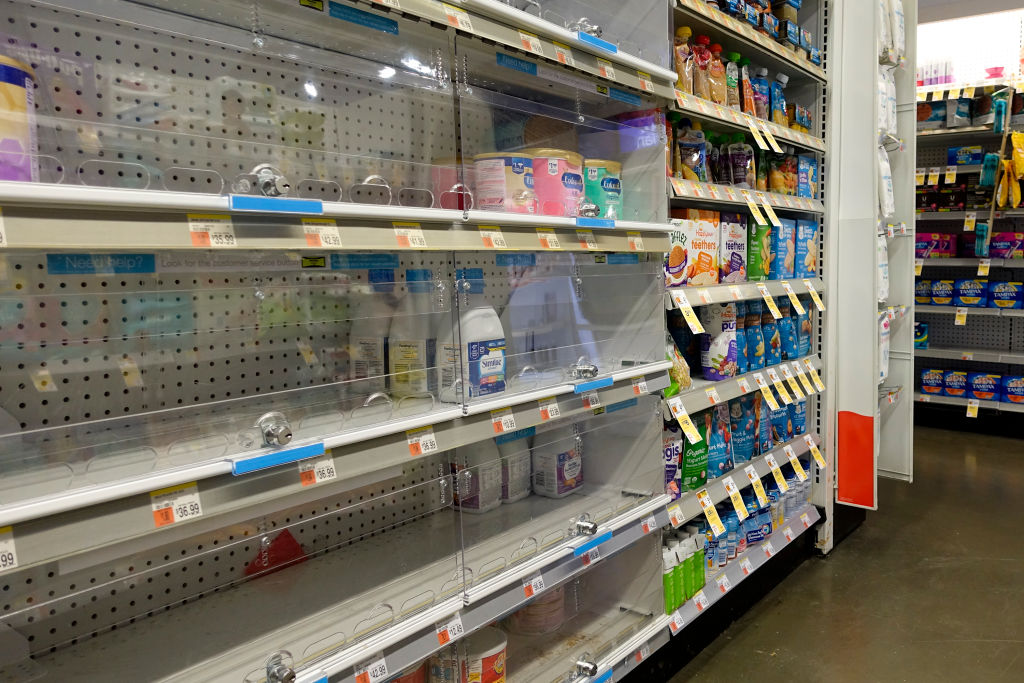
Parents across the U.S. have been scouring social media or crossing states to get hold of baby formula amid a national shortage driven by ongoing pressure on supply chains.
The crisis has worsened in the past few weeks as 40% of popular baby formula brands were sold out at U.S. retailers in the week beginning April 24, according to an analysis by Datasembly of more than 11,000 stores. That’s up from 31% less than two weeks earlier, and 11% in November 2021.
Datasemly found that more than half of baby formula products were completely sold out in Iowa, South Dakota, North Dakota, Missouri, Texas, and Tennessee during the week of April 24.
The strain on supplies has forced major retailers including Walgreens, CVS, and Target to limit the amount of the specially formulated milk customers can buy, according to USA Today. Images shared on social media show empty shelves in the formula aisles.
Why is there a baby formula shortage?
In the past few months a number of factors have piled pressure on national and global supply chains. These include staff shortages due to COVID-19, increased demand for many products and services following the easing of lockdown restrictions, the war in Ukraine and related international sanctions, and shortages of some commodities.
Read more: How American Shoppers Broke the Supply Chain
But the shortage of baby formula was exacerbated when Abbott—producer of top U.S. brand Similac—shut a major factory in Michigan and issued three product recalls in February over contamination concerns. According to the Food and Drug Administration, four babies fell sick, including two who died, after being fed formula produced in the factory.
In March the FDA published preliminary findings from an investigation carried out in late 2021 that Abbott failed to maintain sanitary conditions in the factory. In a separate FDA investigation following the babies’ deaths, product samples collected at Abbott’s Michigan factory tested negative for Cronobacter, the bacteria which the FDA says may have contributed to the two babies’ deaths. The regulator said in a statement that it is working with the company to reopen the Michigan factory.
But pressure is mounting on the FDA, which was accused by Democratic Representative Rosa DeLauro of responding “too slowly” to the shortages.
Read More: 5 Parents on the Stress on Trying to Feed Their Babies Amid a Nationwide Formula Shortage
“A nationwide formula shortage has left babies without proper nutrition and parents without options,” Republican Senator Tom Cotton tweeted. “The @us_fda must do everything in its power to reopen the Abbott plant.”
Abbott is the main supplier of baby formula to low income women and children through state benefit programs such as the Special Supplemental Nutrition Program for Women, Infants, and Children (WIC). The manufacturer was the exclusive supplier for more than half of the agencies administering WIC, Brian Dittmeier of the National WIC Association told the New York Times.
Panic buying has added to the crisis in recent weeks. In response, retailers like Walgreens are limiting consumers to buying three cans at a time, the BBC reported. One 12.4 ounce container of formula typically produces around 15 bottles, which would only last for a few days.
Walgreens said in a statement to the BBC that it was working with its suppliers “to best meet customer demands.”
What are baby formula companies saying about the shortage?
Abbott said in a statement that it is working with the FDA to reopen its Michigan factory, and is shipping extra formula from a plant in Ireland. The company expects shipments from the country to double this year.
The company also said it would restart production of the formula products when the FDA gives its approval. In this case, it would take six to eight weeks to get products back on the shelves.
“We know that our recent recall caused additional stress and anxiety in an already challenging situation of a global supply shortage,” Abbott said in a statement last month. “We are working hard to help moms, dads and caregivers get the high-quality nutrition they need for their babies.”
Other suppliers are adapting to meet consumers’ increased demand following the Abbott recall. The manufacturer of the Enfamil formula told USA Today that its factories are running 24/7 and shipped out 30% more of its formula during its first quarter of the year.
What should parents and caregivers do?
The shortages are understandably making parents and caregivers extremely anxious. Some have turned to social media groups to find out stock levels at different stores, while others have been forced to travel across states or pay extortionate prices online. On Tuesday, many eBay listings for four cans of infant formula were priced at more than $130.
Specialty formulas for babies with allergies or medical needs are proving even harder to find. Shortages of these products are especially concerning as infants often cannot drink alternatives. The FDA advises parents and caregivers to contact their child’s healthcare provider if they cannot access these essential specialist formulas.
The regulator has also issued guidelines on how to check whether formula products fall within the recent recalls. The FDA also warned against diluting infant formula or attempting to make homemade alternatives.
Does baby formula expire?
Yes, baby formula does expire. The can should tell you the expiration date, which is usually a year for unopened products. The FDA warns against ordering formula online from outside the U.S., as it could be counterfeit.
More Must-Reads from TIME
- Cybersecurity Experts Are Sounding the Alarm on DOGE
- Meet the 2025 Women of the Year
- The Harsh Truth About Disability Inclusion
- Why Do More Young Adults Have Cancer?
- Colman Domingo Leads With Radical Love
- How to Get Better at Doing Things Alone
- Michelle Zauner Stares Down the Darkness
Contact us at letters@time.com